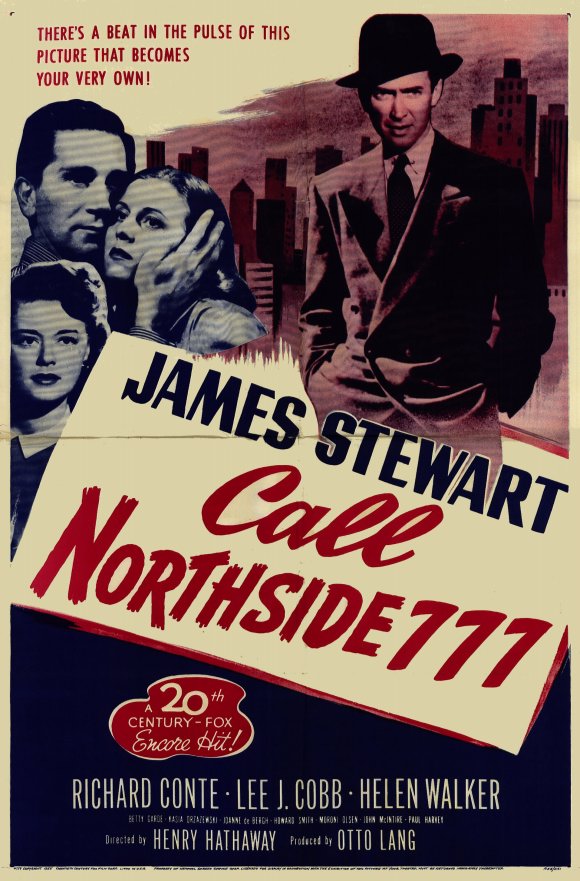
Call Northside 777 (1948)
Call Northside 777 is a 1948 reality-based newspaper drama directed by Henry Hathaway. The film parallels the true story of a Chicago reporter who proved that a man jailed for murder was wrongly convicted 11 years before. James Stewart stars as the persistent journalist and Richard Conte plays the imprisoned Frank Wiecek. Wiecek is based on Joseph Majczek, who was wrongly convicted of the murder of a Chicago policeman in 1932, one of the worst years of organized crime during Prohibition.
Director – Henry Hathaway
Writers – Jerome Cady (screen play), Jay Dratler (screen play), Leonard Hoffman (adaptation)
Cast –
James Stewart as P.J. McNeal (based on real life reporter James McGuire)
Richard Conte as Frank Wiecek (based on real life convict Joseph Majczek)
Lee J. Cobb as Brian Kelly (based on real life editor Karin Walsh)
Helen Walker as Laura McNeal
Betty Garde as Wanda Skutnik (based on real life witness Vera Walush)
Kasia Orzazewski as Tillie Wiecek (based on real life mother Tillie Majczek)
Joanne De Bergh as Helen Wiecek
Michael Chapin as Frank Wiecek Jr.
Howard Smith as K.L. Palmer (based on real life manager K.L. Endecott)
Moroni Olsen as Pardon Board Chairman
J.M. Kerrigan as Sullivan
John McIntire as Sam Faxon
Paul Harvey as Martin J. Burns (based on real life lawyer Martin J. Scott)
George Tyne as Tomek Zaleska (based on real life convict Theodore Marcinkiewicz) (uncredited)
Leonarde Keeler as Himself – the actual inventor of the Polygraph (uncredited)
E. G. Marshall as Rayska (uncredited)
Thelma Ritter as receptionist (uncredited)
Lionel Stander as Corrigan – Wiecek’s cellmate (uncredited)
Truman Bradley as the narrator (uncredited)
Samuel S. Hinds as Judge Charles Moulton (uncredited)
Watch “Call Northside 777” (1948)
Plot
In Chicago in 1932, during Prohibition, a policeman is murdered inside a speakeasy. Frank Wiecek (Richard Conte) and another man are quickly arrested, and in November 1933 are convicted and sentenced to serve 99 years imprisonment each for the killing.
Eleven years later, Wiecek’s mother (Kasia Orzazewski) puts a classified ad in the Chicago Times, offering a $5,000 reward for information about the true killers of the police officer. This leads the paper’s city editor, Brian Kelly (Lee J. Cobb), to assign reporter P.J. McNeal (James Stewart) to look more closely into the case. McNeal is skeptical at first, believing Wiecek to be guilty. But he starts to change his mind, and meets increased resistance from the police and the state attorney’s office, who are unwilling to be proved wrong. This is quickly followed by political pressure from the state capital, where politicians are anxious to end a story that might prove embarrassing to the administration.
Eventually, Wiecek is proved innocent by, among other things, the enlarging of a photograph showing the date on a newspaper that proves that a key witness statement was false. (In actuality, innocence was determined not as claimed in the film but when it was found out that the prosecution had suppressed the fact that the main witness had initially declared that she could not identify the two men involved in the police shooting.)